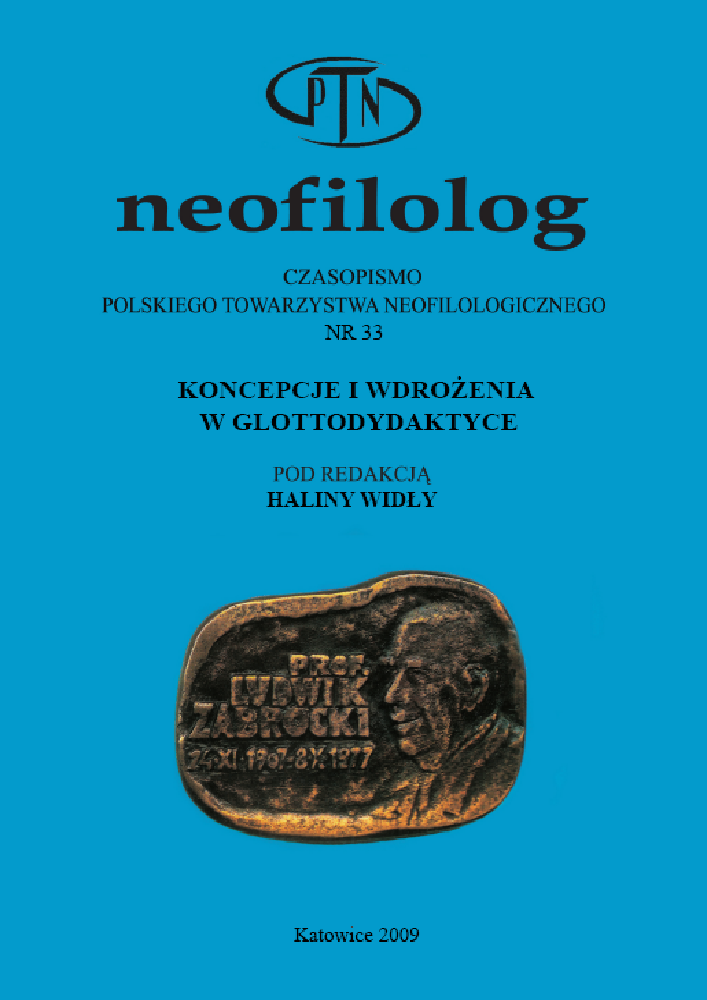Abstract
The aim of the article is to present the ways in which blogs can be used in the teaching of German. The constant drive for making the teaching process more attractive and innovative encouraged teachers to search for innovative solutions in new media. Blogging may support the teaching process. The composition classes described below were based on selected blogs, whose content was supposed to encourage students to voice their opinions. Thus they had the opportunity to actively develop and improve their speaking and writing skills in the context of meaningful discourse.
References
Antos, G.1997. «Teksty jako formy konstytuowania wiedzy. Ewolucyjne fundamenty lingwistyki tesktu – tezy» (w) Lingwistyka tekstu w Niemczech. Pojęcia, problemy, perspektywy. Antologia tłumaczeń. (red. Z. Bilut-Homplewicz, W. Czachur, M. Smykała). Wrocław: ATUT, s. 171 – 195
Antos, G. 1997: «”Teksty ukazują wiedzę!” O prymacie medialności w pełnym napięć obszarze pomiędzy światem tekstów i (między)kulturowymi konstrukcjami rzeczywistości» (w) Lingwistyka tekstu w Niemczech. Pojęcia, problemy, perspektywy. Antologia tłumaczeń. (red. Z. Bilut-Homplewicz, W. Czachur, M. Smykała). Wrocław: ATUT, s. 279 – 290
Fix, U. 2000. «Aspekty intertekstualności» (w) Lingwistyka tekstu w Niemczech. Pojęcia, problemy, perspektywy. Antologia tłumaczeń. (red. Z. Bilut-Homplewicz, W. Czachur, M. Smykała). Wrocław: ATUT, s. 196 – 210
Jäger, S. 2004. Kritische Diskursanalyse. Eine Einführung. Münster: UNRAST-Verlag
Warnke, I.2002. «Żegnaj tekście – witaj dyskursie? O sensie i celu poststrukturalistycznego uwolniena pojęcia tekstu» (w) Lingwistyka tekstu w Niemczech. Pojęcia, problemy, perspektywy. Antologia tłumaczeń. (red. Z. Bilut-Homplewicz, W. Czachur, M. Smykała). Wrocław: ATUT, s. 343 – 360
License
Copyright (c) 1970 Joanna Pędzisz

This work is licensed under a Creative Commons Attribution-NoDerivatives 4.0 International License.
Authors
Authors of texts accepted for publication in Neofilolog are required to complete, sign and return to the Editorial team’s office the Agreement for granting a royalty-free license to works with a commitment to grant a CC sub-license.
Under the agreement, the authors of the texts published in Neofilolog grant Adam Mickiewicz University in Poznań a non-exclusive, royalty-free license and authorize the use of Attribution-NoDerivatives 4.0 International (CC BY-ND 4.0) Creative Commons sub-license.
The authors retain the right to the free disposal of the work.
Users
Interested Internet users are entitled to use works that have been published in Neofilolog since 2017, under the following conditions:
▪ attribution – obligation to provide, together with the distributed work, information about the authorship, title, source (link to the original work, DOI) and the license itself.
▪ no derivatives – the work must be preserved in its original form. Without the author's consent, it is not possible to distribute the modified work in the form of translations, publications, etc.
Copyrights are reserved for all texts published since 2017.
Miscellaneous
Adam Mickiewicz University in Poznań retains the property right as a whole (layout, graphic form, title, cover design, logo etc.).
